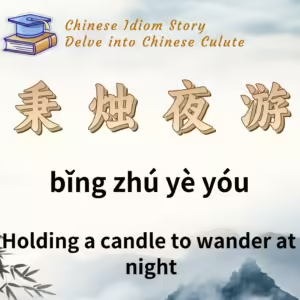
Chinese Idiom: 剪烛西窗 (Jian Zhu Xi Chuang)
English Translation: Cutting the candle at the western window
pīn yīn: jiǎn zhú xī chuāng
Idiom Meaning: Originally referring to the longing for a distant spouse and wishing for a reunion; it now broadly signifies intimate conversations among friends and family.
Historical Source: From Li Shangyin’s poem 夜雨寄北 (Night Rain Sent North) during the Tang Dynasty.
Idiom Story:
This poem was written during the Dazhong era when Li Shangyin served as an aide to the military governor Liu Zhongying in Dongchuan. The Sichuan region is known for its frequent rain and fog, leading people to use the saying “蜀犬吠日” (Sichuan dogs bark at the sun) to describe the rarity of sunny days. The late summer and autumn were particularly characterized by continuous rainy weather.
While staying in a foreign land during a rainy autumn night, Li Shangyin felt a deep longing for his wife back in Chang’an. Inspired by his feelings, he penned the poignant seven-character quatrain 夜雨寄北 (Night Rain Sent North):
君问归期未有期,
巴山夜雨涨秋池。
何当共剪西窗烛,
却话巴山夜雨时。
In English, the poem conveys:
“You ask me when I will return, but I cannot say for certain.
In this quiet autumn night at the inn, the night rain in Ba Mountain fills the pond to the brim.
When will we sit together under the western window, cutting the candle,
and recount the scenes of the rainy nights in Ba Mountain?”
In the poem, “君” (you) refers to the poet’s wife, the daughter of Wang Maoyuan, the military governor of Jingyuan. “巴山” (Ba Mountain) signifies the mountainous border region of Sichuan and Shaanxi. “涨秋池” (the pond fills with autumn rain) reflects the heavy rainfall affecting the landscape. “何当” (when) expresses the poet’s desire to know when they can be reunited, while “却话” (recount) indicates the longing to share stories and experiences.
Li Shangyin’s vivid imagery illustrates his yearning for companionship, emphasizing the warmth of shared moments amidst the loneliness of separation. The phrase “何当共剪西窗烛” (When can we cut the candle at the western window together?) later evolved into the idiom 剪烛西窗, symbolizing the tender moments of conversation and connection between loved ones.






